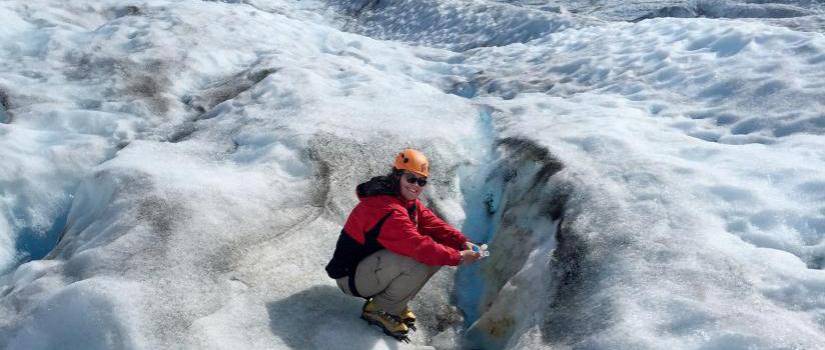Geology Student Sees Signs of Life in the Ice
“A glacier is not a vast sheet of nothing living,” says Alex Holland, senior geology student. “Life thrives there, but people might not notice it at first.” Holland, who plans to graduate this May, is fascinated by Arctic spaces and the surface chemistry of glaciers. In her research, she investigates the darkening surfaces of glaciers, a problem she and other scientists in the field attribute to a combination of dust, combustion, and microbes. Holland’s work probes at these environmental questions: What influences the melting rates of glaciers, and what role do microbes play in the melting process?
Holland did not originally set out to study glacial ice, however. She began her studies at UofSC with a desire to enter the oil and gas industry, her goal being “to change the industry from the inside.” As a sophomore, Holland was then awarded a prestigious Magellan Scholarship, which allowed her to travel to Alaska to gather ice samples with Arts & Sciences' Earth and Ocean Sciences Professor Lori Ziolkowski. It was during this trip that Holland’s educational and career goals underwent a dramatic change. “Walking on a glacier changed my life,” she says. “I got up to the top of the glacier and knew this was my true passion—this was what I wanted to study for the rest of my career.”
In the fall, Holland begins a doctoral program in physical geography at the University of Bristol in the UK. The program’s emphasis on glaciology and Arctic environments appeals to Holland’s interest in ice, and a month before the fall term begins she and her cohort will meet in Greenland to gather ice samples. During the first year of her program, Holland will then be working with these samples in the lab, a process she came to know well while working in Professor Ziolkowski’s lab as an undergraduate.
Holland values her time spent in the lab, and she compares methods and analysis to creating a story. “In the lab you get to take numbers and make a story out of them,” she says. “It was tough at first to figure out what that story was. I studied other people’s papers, and experimented with different equations. I felt really defeated at first, but that open time in the lab was such a learning experience. It was very important to have the time and space to flounder, because that’s how you learn!”
A glacier is not a vast sheet of nothing living. Life thrives there, but people might not notice it at first.
Holland cannot emphasize enough the importance of seeking out a mentor as an undergraduate student. Finding a way into a lab, she says, is invaluable for those wishing to pursue a career in the sciences. “Get into a lab and work closely with a mentor; don’t be discouraged because you are a freshman. Email a professor to see if you can help, and don’t get discouraged if at first professors say no.” In addition to gaining valuable experience in the lab beginning her freshman year, Holland also helped Joel Bostic, a marine science graduate student, conduct field work along the Gulf Coast during the summer of 2015.
In March, Holland presented her findings at the Southeastern Biogeochemistry Symposium and the Geological Society of America’s South Eastern Conference. Additionally, she will present at UofSC’s Discovery Day on April 22. The College of Arts & Sciences is very proud of all that Holland has accomplished as an undergraduate student, and we look forward to hearing about her future accomplishments as a doctoral student in England!
